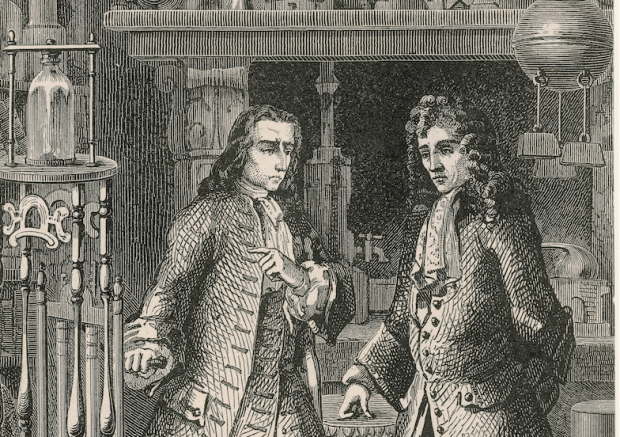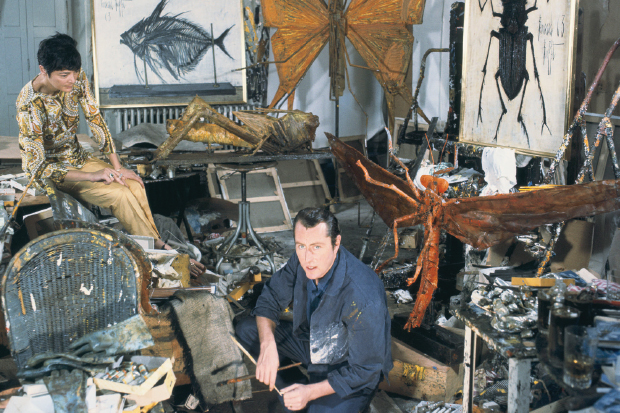There was no science before 1572, the year that Tycho Brahe saw a new star in the night sky above him. To be sure, the Greeks had made efforts to present their knowledge of nature in a systematic fashion, but they lacked the tools — more specifically they lacked the ways of thinking — that have allowed investigators over the past 300 years to question the traditions that have preceded them, to probe the inner workings of nature, and in so doing to build increasingly informative accounts of the world that surrounds us. These ways of thinking were invented over the course of the 17th century: a period whose momentous significance for all that would come after amply justify naming it ‘the scientific revolution’.
These are the claims David Wootton makes in this big, belligerent book. The book is big because, apparently, his publisher asked that it be so. Wootton obliged by delivering a giant plum pudding of a treatise to Allen Lane, with well over 500 pages of main text laden with nuggets of extraordinary erudition, and soaked generously with three different kinds of scholarly notes — one for references, one for argumentative asides and another for longer reflections on topics in philosophy and historiography that he somehow wasn’t able to fit into the rest of the book.
It is hardly news that Wootton’s period was exceptionally important for the genesis of what we now think of as science. It was the time of the founding of the Royal Society, and the era of the megafauna of natural knowledge: big beasts like Newton, Galileo, Brahe and Kepler. The Invention of Science is nonetheless belligerent because it is dedicated, in large part, to a repeated series of attacks on many of today’s most influential historians of science, whose work has been a disappointment to him. The book ‘was born out of a sense that for the most part, and with some honourable exceptions, historians of science were not doing their subject justice’.
The Harvard historian Steven Shapin — one of Wootton’s many adversaries —notoriously kicked off his own influential account of these times by quipping: ‘There was no such thing as the scientific revolution, and this is a book about it.’ Wootton argues, to the contrary and with great verve, that the very ideas of discovery, fact, evidence, experiment, theory and so forth, were born during the 17th century. These are still, he says, the operative ideas that underlie modern science, and they have been vital elements of our capacity to produce ever-expanding bodies of natural knowledge. And Wootton’s scientific revolution is not an upheaval that can only be discerned in retrospect. He argues that many of his protagonists knew what they were up to, and that this self-conscious zeal on the part of the actors further justifies his insistence that this was a genuine revolution.
In support of this claim, Wootton recruits an embedded reporter, a late 17th-century clergyman and Fellow of the Royal Society whose name — William Wotton — raises suspicions of nepotistic collusion across the centuries. Writing close to the field of combat, Wotton detected the very same upheavals in knowledge production that Wootton himself now discerns with the benefit of historical distance.
One of Wootton’s primary goals in this book is to stamp out a dangerous epidemic of relativism, which he believes has infected the majority of his historical colleagues. He has fun pointing out the silliness of Bruno Latour’s jaw-dropping insinuation — perhaps made in jest, but who can tell with Latour? — that the pharaoh Ramses II could no more have died of tuberculosis than of a machine-gun attack. Latour seems to suggest that Ramses couldn’t have died of tuberculosis because the bacillus was not discovered until 1892. The obvious response is to point out that it’s perfectly possible for a human to die at the hands of agents that no one knows about. To think otherwise would recommend collective virological amnesia as an intervention to eliminate HIV on the grounds that what we don’t know can’t hurt us.
Wootton defends the admirable view that we need to avoid the excesses of ‘too much relativism’ on the one hand, and ‘too much realism’ on the other. Relativists, he thinks, ignore the manifest fact that the world itself pushes back against our theories, causing scientists to discard cherished ideas when they run up against problematic evidence. Realists, on the other hand, ignore the equally manifest fact that scientific knowledge is built by groups of human investigators. So ‘the realists’ are wrong if they deny that science is a social construct; and ‘the relativists’ are wrong if they assert that science is merely a social construct. With only a few exceptions, this means that Wootton thinks more or less everyone who has written about the history and philosophy of science in the past few decades is fundamentally muddle-headed.
He is particularly troubled by something called the ‘symmetry principle’. This is one of the basic tenets of the so-called Edinburgh School, influenced by the sociologists Barry Barnes and David Bloor, and Wootton takes it to be emblematic of the foolish relativism he opposes. In Barnes’s and Bloor’s words, this principle tells us that
all beliefs are on a par with one another with respect to the causes of their credibility. It is not that all beliefs are equally true or equally false, but that regardless of truth and falsity the fact of their credibility is to be seen as equally problematic.
A good sociologist, or a good historian of knowledge, should
simply investigate the contingent determinants of belief and reasoning without regard to whether the beliefs are true or the inferences rational. They exhibit the same degree of curiosity in both cases.
Why does Wootton take issue with this principle? It does not tell us that all beliefs are equally true: it does not tell us that Aristotle was no more and no less correct about the universe than Einstein; it does not deny that science makes progress over time.
Darwin was pretty much right about evolution, and Lamarck was largely wrong. But we should not assume because of this that there is no interesting explanation for how Darwin came to his views. Instead, we should be just as curious about how Darwin came to views we regard as correct, as we are about how Lamarck came to views we think of as wrong. And we should not assume, just because we think Darwin got it right, that politics cannot feature in his story: Darwin’s theorising about selection is saturated with the language of the marketplace; it is a product of a Victorian capitalist milieu. Adherence to Barnes’s and Bloor’s methodological relativism helps to expose all this, without thereby showing us that Darwin’s theory is no better than Lamarck’s.
The great strength of Wootton’s book lies in the demonstration that notions that we might today take for granted — concepts like ‘discovery’, ‘fact’, ‘theory’, ‘experiment’ and so forth — are by no means self-evident or inevitable. Nature does not present us with these ideas, which need only to be taken from their boxes and put to work by any competent observer. Instead, they needed to be constructed. In demonstrating in marvellous historical detail how that all happened, Wootton shows the value of the very idea he attacks: the relativism of curiosity.
Got something to add? Join the discussion and comment below.
Available from the Spectator Bookshop, £25, Tel: 08430 600033. Tim Lewens’s The Meaning of Science was published last year.
You might disagree with half of it, but you’ll enjoy reading all of it. Try your first month for free, then just $2 a week for the remainder of your first year.













